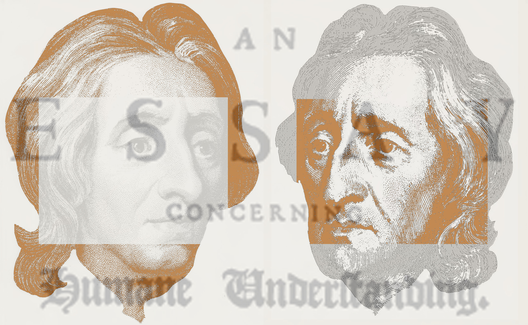John Locke1632–1704
Locke rejected one of Descartes's principal concepts, that of innate ideas, initiating the continuing debate between nativists and empiricists. Instead of accepting that some ideas, such as unity or God, are inborn, Locke proposed that all knowledge derives from experience. In An Essay Concerning Humane Understanding (1690) he wrote: "Let us then suppose the Mind to be, as we say, white Paper, void of all Characters, without any Ideas; How comes it to be furnished? Whence comes it by that vast store, which the busie and boundless Fancy of Man has painted on it, with an almost endless variety? Whence has it all the materials of Reason and Knowledge? To this I answer in one word, from Experience: In that all our Knowledge is founded, and from that it ultimately derives it self... Our Observation employ'd either about external, sensible Objects; or about the internal Operations of our Minds, perceived or reflected on by our selves, in that, which supplies our Understandings with all the materials of thinking. These two are the Fountains of Knowledge, from whence all Ideas we have, or can naturally have, do spring." The senses provided the only route through which knowledge could be acquired, and what is perceived is always an idea rather than an object. Simple ideas, like whiteness, are produced passively via the senses, whereas complex ideas, like snow, result from active reflection by the mind. The transformation from simple to complex was effected by a process of mental chemistry. In this regard, Locke was influenced by the atomistic concepts of chemistry, and he was a close associate of Boyle, one of the foremost chemists of the day. Thus, Locke rejected the Cartesian rationalism prevailing in continental Europe and established empiricism in Britain. He shared with Bacon a distrust of language as a basis for understanding nature, and he built upon Hobbes's materialism. In later editions of his Essay he proposed that ideas could be associated with one another, providing a basis for learning. Locke was trained in classics and taught philosophy in Oxford. He lived through the heady political times of the English Civil War, and politics was his first love. He became a Fellow of the Royal Society and was acquainted with the leading scientists of his day, including Newton. It was not during his time at Oxford that he wrote on philosophy and politics; he left there to study medicine and subsequently found a more congenial atmosphere for his views in the diplomatic service. His Essay was published after almost twenty years of preparation, some of which was spent in exile in Holland. Two portraits of Locke are shown together with the title page of the second edition of his Essay (1694). The portraits have been rendered in line form and in order to represent the importance of the senses in Locke's philosophy, the eyes, ears, nose, and mouth have been covered by a blank, transparent sheet of paper (tabula rasa) on the left, whereas the senses are exposed on the right.
